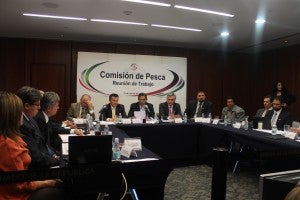 EDF was recently invited by the Fisheries Committee of the Mexican Senate to present a study on Illegal fishing in Mexico that we have developed with the Mexican Institute of Competitiveness (IMCO) and other partners. Three of the five Senators who make up the Committee were present: the Chair – Sen. Francisco Lopez Brito (PAN, Sinaloa), the Secretary – Sen. Oscar Rosas González (PRI, Campeche), and Sen. Ernesto Ruffo (PAN, BC). Also in attendance was the General Director and several staff from National Fisheries Institute of Mexico (INAPESCA), as well as representatives from fishermen´s associations from both the industrial and small-scale fleets.
EDF was recently invited by the Fisheries Committee of the Mexican Senate to present a study on Illegal fishing in Mexico that we have developed with the Mexican Institute of Competitiveness (IMCO) and other partners. Three of the five Senators who make up the Committee were present: the Chair – Sen. Francisco Lopez Brito (PAN, Sinaloa), the Secretary – Sen. Oscar Rosas González (PRI, Campeche), and Sen. Ernesto Ruffo (PAN, BC). Also in attendance was the General Director and several staff from National Fisheries Institute of Mexico (INAPESCA), as well as representatives from fishermen´s associations from both the industrial and small-scale fleets.
This is the first time EDF attended one of the monthly public meetings of the Committee. Pedro Zapata (EDF de Mexico Director) and Rodrigo Gallegos (Director for Global Warming from IMCO) made remarks and presented key conclusions from this study, which we hope will open up a constructive dialogue on this critical and complex issue. A few of the main points presented follow:
- The Mexican fishing sector has consistently lost competitiveness over time, as reflected by its stagnant economic returns and catch volumes, even as the size of the fleet continues to increase (mostly in the small-scale sector). The fisheries sector has decreased consistently as a percentage of GDP, of which it now represents less that 0.06%.
- Part of the reason for this loss of competitiveness is the modest economic impact of fisheries in Mexico, which result in very little activity in the value chain, i.e. gear and equipment sales, processing, transport, etc… Mexican fisheries generate roughly 30 additional cents for every dollar of fish caught and sold back into the economy, far from the world´s average, which is closer to 3 dollars of additional economic activity.
- One of the reasons for this complex problem is the high level of illegal fishing, which, by our estimates, represents roughly 60% of total production in México. Other recent estimates place the number closer to 100%.
- Illegal fishing is driven by many factors, but one of the main causes is a highly complicated and obscure regulatory framework that is difficult to understand. There are so many laws and rules that fishermen often find themselves fishing illegally without realizing it. As the law stands now, there are more than 255 different ways to fish illegally. A fisherman can have the right gear, fish in the right season, for the right species, but in an area that is legally off-limits, or he can be in the right area at the right time of year but fail to land the fish in the right place. This over-regulation complicates the jobs of both fishermen and regulators.
- Predictably, corruption (mostly in the form of bribes to get permits or to avoid punishment) plays an important role and has fueled the increase of illegal fishing. This phenomenon, present in many areas of public policy in Mexico, is boosted by a combination of a complex institutional framework, overwhelmed authorities and very ineffective control measures.
The study was well received by the Senators and the public attending the meeting. Representatives of fishermen associations were enthusiastic to see that this issue, which has been long been a priority to get resolved, was approached in a creative, analytical way. At the end of the session, we were invited to work with this committee in the development of legal and public policy proposals toward having a better regulation of the fisheries in Mexico.
There is a lot more work to do, and this is just one of the first steps towards the construction of a better legal framework in Mexico. Nonetheless, this presentation was an important opportunity for EDF to familiarize the Committee with our mission and goals as well as this important study.









